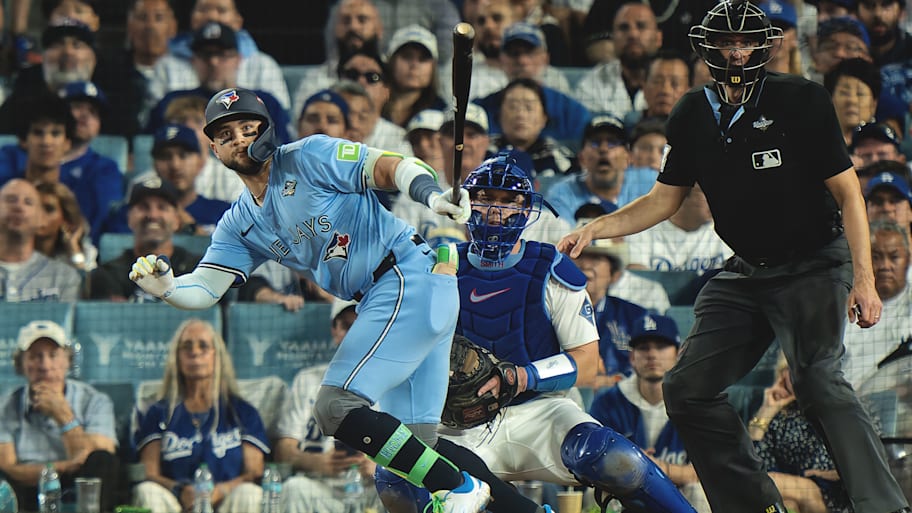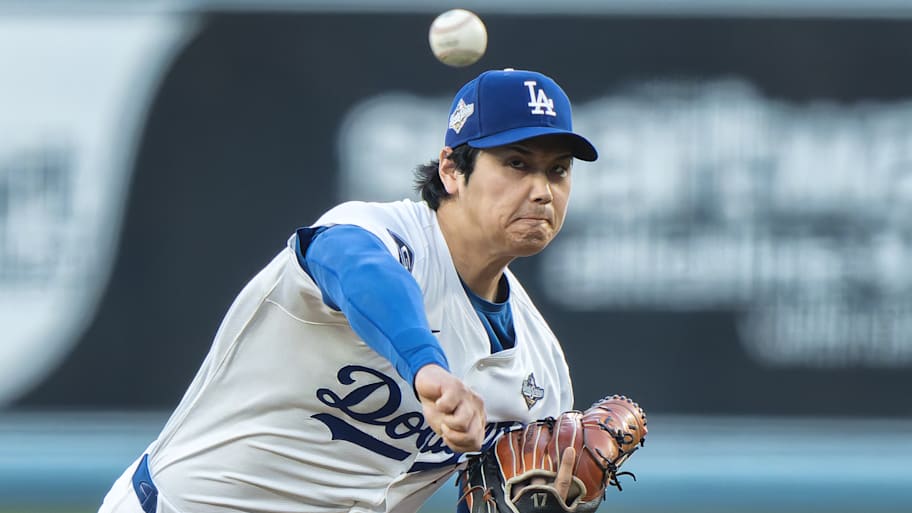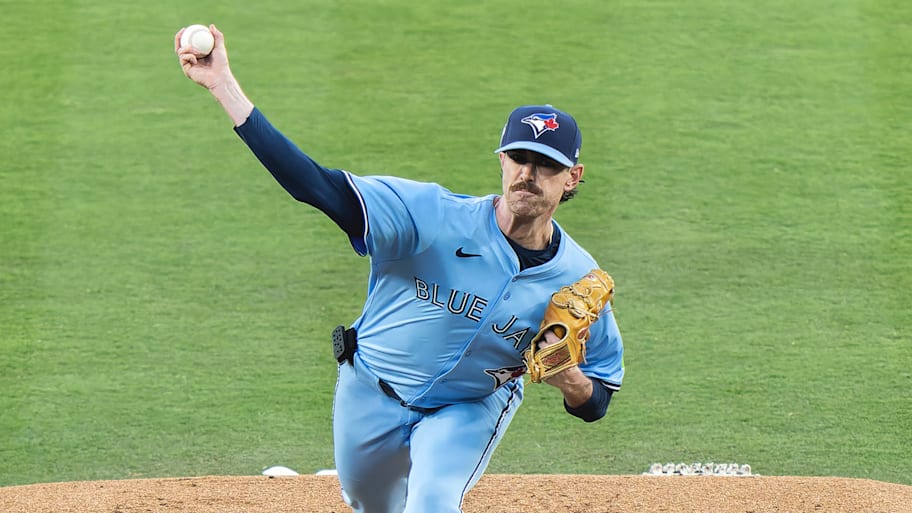LOS ANGELES — Like a Battle of Gettysburg reenactment, the visiting clubhouse of Dodger Stadium in the first hour of Tuesday morning reeked of equal parts loss, pride and discarded bandages. Just as Boston Red Sox manager Alex Cora did in the same room seven years ago, Toronto Blue Jays manager John Schneider poured salve on wounds 18 innings in the making.
“This game,” he told his players, “is not going to beat us twice.”
Said ace pitcher Kevin Gausman, “He was pretty adamant.”
The Red Sox in 2018 Game 3 lost in 18 innings on a walk-off home run. The Blue Jays lost Game 3 Monday in 18 innings on a walk-off home run. Cora in his 2018 postgame address made sure his troops honored the losing pitcher, Nathan Eovaldi, who threw 97 pitches in emergency relief work. Cora believes the Red Sox won the World Series that night because of not just how Eovaldi saved the bullpen from overuse but also the way he personified the grit of the team.
Carlos Febles, a coach with those Red Sox and these Jays, was the one person in the room on both nights of the two most grueling losses in World Series history.
“Erik Lauer,” he said to Schneider, “is our Nathan Eovaldi.”
Lauer threw 4 2/3 innings in the defeat, his longest outing in two months.
At least for one game, the Blue Jays reenacted the postscript to the original Battle of 18 Innings. They had no business winning Game 4, at least if you buy into narratives, what with Jays DH George Springer, an all-time great World Series slugger, out with an oblique injury suffered in Game 3 and the Dodgers giving the ball to Shohei Ohtani, who was unbeaten with a 1.33 ERA at Dodger Stadium in his career. The Blue Jays did not care and won 6–2.
“Really, it just started last night,” Gausman said. “It was just flushing it and moving on to the next one. Maybe that’s a little naïve, but we just kind of believe that the next guy up mentality. We’re good whatever happens, going up against anybody, whoever’s pitching on the other side.
“So, it was really just kind of hurry up and go to sleep and get ready for tomorrow and today. Yeah, I mean, it's pretty loose in here. This is the loosest team I’ve ever been on. Nothing changed today.”
Stop me if you heard this before: Vlad Guerrero Jr. hit a home run (off a hanging sweeper from Ohtani, who had allowed one homer on the pitch all year), the Jays’ fast-break offense put up four runs in a 19-pitch eyeblink in the seventh inning (without benefit of a home run), and the pitching staff worked its pitching backward postseason philosophy to exquisite results.

Toronto has been playing such grinding baseball all postseason. Now it is the Dodgers who are feeling its wrath. Shane Bieber flummoxed a flat Los Angeles lineup with a buffet of darting pitches, including only 27% fastballs. The Dodgers swung and missed only five times against him but appeared to be swinging wet newspapers against the floaters and spinners he kept serving.
Toronto threw the fewest fastballs in the postseason of any staff in the pitch tracking era (since 2008) to reach the World Series: 37.9%. They have boosted that percentage slightly in the World Series, to 44%, but that’s still lower than all 36 teams in the World Series since 2008 except the 2022 Phillies.
“I think that was maybe Shane’s plan going in—to mix it up and not necessarily throw too many pitches back-to-back,” Gausman said. “He has the luxury of having a lot of pitches. They can go away from a righthand hitter and go in on the lefties.”
Bieber offered a delicious sampler of goodies. He threw five pitch types, all at least 14% of the time and none more than 27%.
Shane Bieber strikes out Shohei Ohtani to end his #WorldSeries-record on-base streak at 11 consecutive plate appearances 😳 pic.twitter.com/RRd46nzxMl
— MLB (@MLB) October 29, 2025
The biggest concern for Dodgers manager Dave Roberts entering the World Series was that the back half of his lineup would not provide enough resistance. He was wary of giving Toronto starters “catch your breath” innings. That is exactly how it is playing out. The 7-8-9 sports in the Los Angeles lineup are hitting .143.
Things have become so desperate Roberts mused after Game 4 about lineup changes involving bench players Miguel Rojas and Alex Call.
“We haven't found our rhythm. We haven’t,” Roberts said. “It sort of draws dead at certain parts of the lineup and different parts, different innings, different games. Guys are competing. Certainly, in the postseason, you're seeing everyone's best.
“But, yeah, my hope is we regroup tomorrow, gather the information that we had from [Game 1 starter Trey] Yesavage, and keep him in the hitting zone, and understand what that split does, which is certainly helpful, and when we get the fastball, really get on it.”

Ohtani gave a brave effort after exhausting himself in Game 3 with body cramps so bad Roberts visited him at second base in the 11th inning to see if he needed to come out of the game to prepare for his Game 4 start.
“Hey, how are you feeling?” Roberts asked him. “Cramps,” Ohtani said.
“Give me a run. Let me see what you can do,” Roberts said. “Can you score from second base?” Ohtani gave a brief jog. He flashed a thumbs up to Roberts.
“That’s all I needed to hear,” Roberts said. “Thing is, he was dealing with cramps all night.”
The night extracted its toll. Ohtani did not have his best top-line fastball. His velocity was down a tick, and then down another tick in the seventh when the Jays peppered two of his heaters for hits to start the four-run fast break.
Toronto hung the first Dodger Stadium loss on Ohtani. The Jays guaranteed the series will get back to Toronto for at least a Game 6. Just like the 2018 Red Sox, they won a game the very next day after taking longer than any other team to lose a World Series game.
“The way we played tonight,” said Toronto pitcher Max Scherzer, “is a result of how we just play ball all year. We’ve had our backs against the wall the whole year. You can probably go around the whole room at some point in time and everybody’s had their back against the wall. And yet we've come back and we find a way to go get outs again or go get hits again.
“We find a way to win ballgames. This kind of speaks to our season. Yes, we were disappointed after Game 3, but we knew we put our hearts into that game. What we saw from everybody in this clubhouse just gave us the reason to even believe in each other even more.”
More MLB on Sports Illustrated
This article was originally published on www.si.com as How the Blue Jays Rebounded From a World Series Heartbreaker to Win Game 4.
